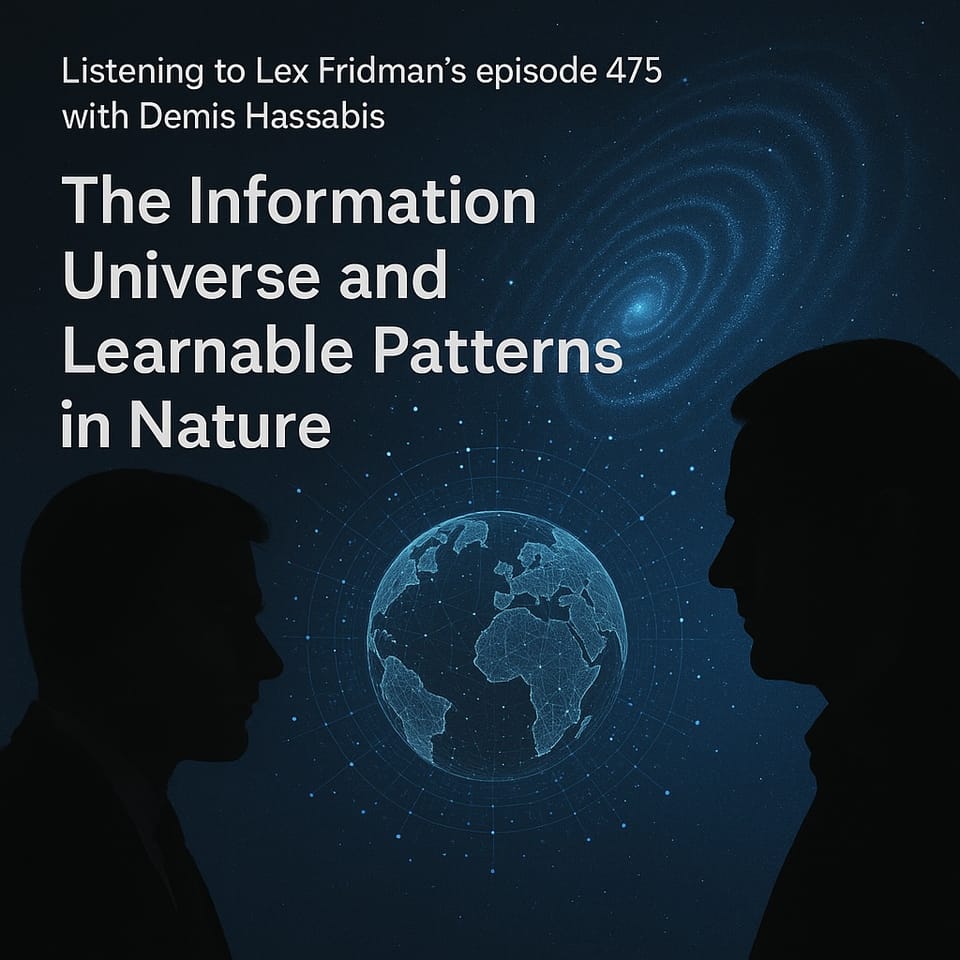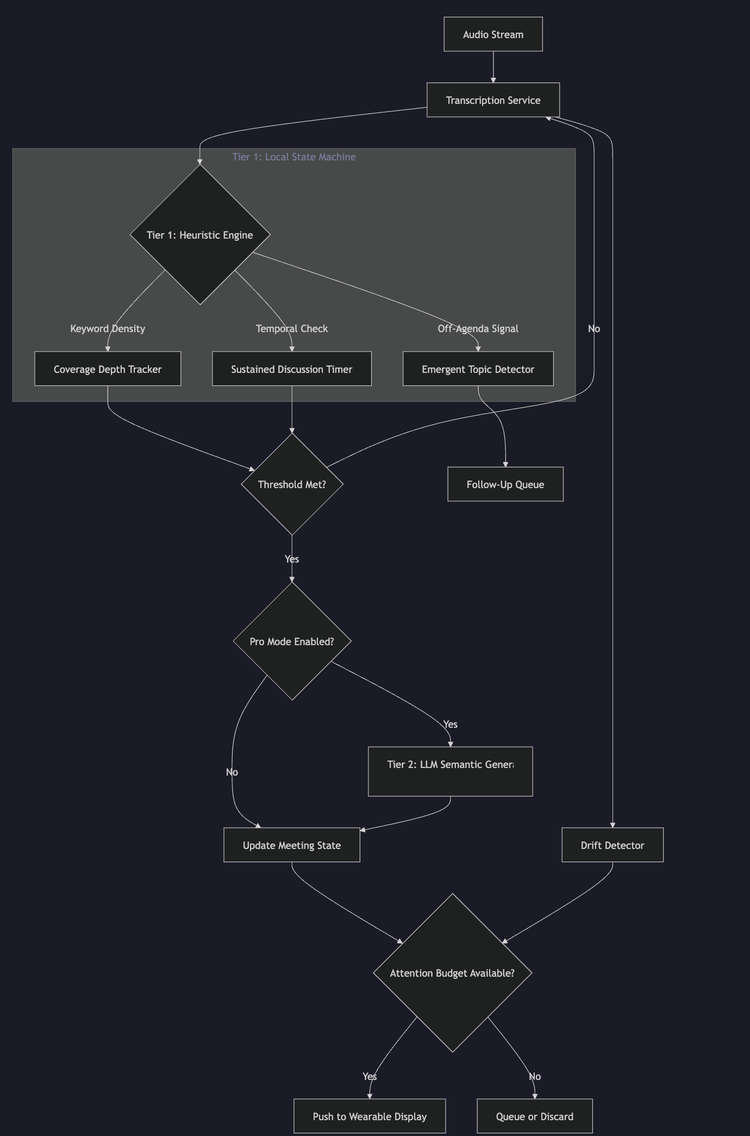The Thought-Provoking Ideas and Theories from Lex Fridman and Demis Hassabis

Listening to Lex Fridman's episode 475 with Demis Hassabis, this conversation represents one of the most intellectually rich explorations of artificial intelligence's philosophical implications in recent years. Their discussion spans fundamental questions about reality, consciousness, computation, and human nature that challenge our deepest assumptions about existence itself.
The Information Universe and Learnable Patterns in Nature
The most profound conceptual framework emerging from their dialogue is Hassabis's revolutionary conjecture that "any pattern that can be generated or found in nature can be efficiently discovered and modeled by a classical learning algorithm". This isn't merely a technical statement—it's a philosophical position about the fundamental nature of reality.
Hassabis proposes that information is the most fundamental unit of the universe, more fundamental than energy and matter. This information-theoretic view suggests that everything from protein folding to planetary orbits exists within learnable patterns because they've been shaped by evolutionary processes—what he calls "survival of the stablest". The implications are staggering: if true, this means that the universe's complexity isn't random chaos but rather structured information that can be decoded by computational systems.
This connects directly to what might become a new complexity class called "Learnable Natural Systems" (LNS)—systems that have evolved or been selected for stability and structure, making them amenable to efficient search and prediction by classical algorithms NP question not as an abstract mathematical problem, but as a fundamental physics question about the nature of computational reality.
The P versus NP Question as a Window into Reality's Structure
The conversation elevates the P versus NP problem from theoretical computer science into the realm of fundamental physics. When you think of the universe as an informational system, then the P equals NP question becomes a physics question. Hassabis suggests that understanding this relationship could be "very enlightening" about how the universe itself is structured.
Their discussion highlights how classical systems have already achieved what many thought impossible—AlphaFold solving protein folding, AlphaGo mastering Go, and video generation models like Veo 3 simulating complex physics from passive observation. These achievements suggest that classical Turing machines can go far beyond what we previously imagined possible, potentially making quantum computation unnecessary for many problems we assumed required it.
Consciousness and the Hard Problem of AI Understanding
One of the most philosophically challenging aspects of their conversation involves consciousness and AI's relationship to understanding. When discussing Veo 3's ability to generate remarkably realistic physics simulations, they grapple with the question: "To what degree does Veo 3 understand our world?"
Hassabis suggests that the ability to predict coherent future frames is a form of understanding—not deep philosophical understanding, but rather "intuitive physics" similar to how a human child comprehends the physical world. This challenges the embodied cognition thesis, which argues that true understanding requires physical interaction with the world. Instead, passive observation might be sufficient to acquire deep insights into reality's underlying structure.
The conversation explores whether consciousness and intelligence are "double dissociable"—meaning you can have one without the other. Hassabis suggests that artificial systems can be highly intelligent without any form of consciousness, and conversely, that some animals may have consciousness without human-level intelligence.
A particularly thought-provoking idea is Hassabis's speculation about future brain-computer interfaces enabling humans to "feel what it's like to compute on silicon", potentially creating a radical form of empathy between humans and AI systems running on different substrates.
The Origin of Life and Simulation of Reality
Their discussion ventures into one of science's greatest mysteries: the origin of life. Hassabis expresses frustration that "we still can't answer clearly in a simple way" how to define living versus non-living systems. He believes AI could help us understand this by revealing that there's no strict line between non-living and living, but rather a continuum that connects physics, chemistry, and biology.
The concept of creating "virtual cells" represents another ambitious frontier. Hassabis dreams of building computational models that can simulate entire cellular systems, allowing researchers to run thousands of experiments in silico before validating in wet labs. This could revolutionize drug discovery by reducing development time from years to months or weeks.
Video Games as Philosophical Laboratories
The conversation reveals video games as more than entertainment—they're philosophical laboratories for exploring intelligence, reality, and human nature. Hassabis describes games as unique media where "you as the player are co-creating the story", unlike passive forms of entertainment.
Looking toward the future, AI-powered games could create truly open worlds that dynamically adapt to player choices, generating infinite possibilities rather than the illusion of choice. This raises profound questions about the fundamental difference between increasingly realistic simulations and what we perceive as the "real world".
The Nature of Scientific Discovery and Research Taste
A particularly nuanced discussion emerges around what makes great scientists versus good scientists. Hassabis identifies "research taste" or judgment as what separates great scientists from merely good ones. This involves the ability to "sniff out what the right direction is, what the right experiment is, what the right question is".
This connects to the concept of "splitting the hypothesis space"—designing experiments that, whether they succeed or fail, provide equally valuable information. True breakthrough science requires what Hassabis calls a kind of "leap of imagination" that current AI systems cannot yet achieve.
Human Nature and the Future of Meaning
The conversation doesn't shy away from examining human nature itself. They explore how video games serve as safe environments for experiencing competition, mastery, and social interaction, potentially channeling human tendencies like tribalism into constructive rather than destructive pursuits.
Hassabis expresses hope for humanity's future based on our "almost limitless ingenuity" and "extreme adaptability". He marvels at how humans with "hunter-gatherer brains" have successfully adapted to the complexities of the modern world.
Yet they also grapple with deeper questions about what makes humans special—what Hassabis calls an unquantifiable "spark" or "soul" that might be tied to consciousness. AI might help us understand this uniqueness by providing a contrasting "intelligent artifact".
The Integration of Science, Art, and Spirituality
Drawing inspiration from thinkers like Richard Feynman and Baruch Spinoza, Hassabis emphasizes that scientific understanding enhances rather than diminishes the beauty and mystery of the world. He advocates for a holistic approach that embraces rational inquiry alongside recognition of the human spirit, creativity, and search for meaning.
This perspective informs his approach to AI as a tool to deepen our understanding and appreciation of reality, not merely as cold instruments. He stresses the importance of maintaining humility, empathy, and wonder as we navigate AI's transformative potential.
David Foster Wallace and Conscious Awareness
The conversation includes a moving discussion of David Foster Wallace's "This is Water" speech. This serves as a reminder about the importance of conscious awareness and the choice to see beyond our default self-centered perspective. Wallace's message about recognizing "the stories and struggles of others" and cultivating empathy resonates deeply with the challenges of developing AI systems that benefit humanity.
Philosophical Implications for the Future
Hassabis calls for "great philosophers" equivalent to Kant, Wittgenstein, or Aristotle to help navigate the AI revolution. He believes we need profound philosophical thought to guide humanity through the transformation that AGI and artificial superintelligence will bring to "humanity and the human condition".
The conversation estimates a 50% chance of achieving AGI within the next decade, with Hassabis emphasizing that this will require both scaling current techniques and breakthrough innovations. This timeline makes their philosophical explorations not merely academic but urgently practical.
The Ultimate Questions
Perhaps most powerfully, Hassabis articulates the existential urgency driving his work: "How can we not have a good definition of life and not living and non-living and the nature of time and let alone consciousness and gravity and all these things... it's just screaming at me in my face... what is going on here?"
This passionate quest to understand "the nature of reality, which has to be the ultimate question that would answer all of these things"underlies their entire conversation. They see AI not just as a technological achievement, but as potentially "the ultimate tool to help us answer these kinds of questions".
Conclusion: A Roadmap for Understanding Everything
The conversation between Fridman and Hassabis represents more than an interview—it's a comprehensive philosophical framework for understanding AI's role in humanity's deepest questions. From the information-theoretic nature of reality to the simulation of life itself, from consciousness as computation to the future of human meaning, their dialogue provides both intellectual rigor and profound wonder.
Their ideas challenge us to think beyond narrow technical achievements toward AI's potential to unlock the fundamental mysteries of existence. As we stand on the threshold of artificial general intelligence, their conversation serves as both a philosophical foundation and a call to approach these transformative technologies with the wisdom, humility, and sense of wonder that such profound questions demand.
The synthesis of their ideas suggests that we're not just building intelligent machines—we're potentially decoding the universe's information structure itself, with implications that could reshape our understanding of everything from consciousness to the nature of reality. This makes their conversation not just thought-provoking, but essential reading for anyone seeking to understand where artificial intelligence might ultimately lead us.
Sources:





